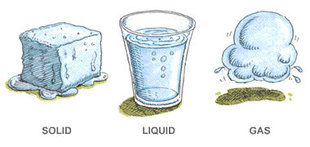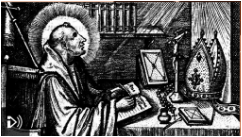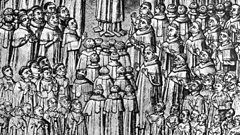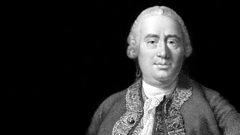But perhaps rather than trying to explain how the doctrine of the Trinity works it might be better to explain how it does not work! There are a number of analogies that do the rounds to try and explain the Trinity; whilst these analogies do help to unlock aspects of the doctrine they are always destined to fail in some way (and this is in the nature of analogies). So I am going to go through a few of them to point out what goes wrong with them.
 Image: northpennwater.org
Image: northpennwater.org The idea is that H2O has three states; solid, liquid and gas. In the same way God has three persons. The issue is that H2O is never in these three states at once whereas God is Father, Son and Holy Spirit at the same time. If you were to believe this of the Trinity you would be guilty of the heresy (theological error) of Modalism; believing that God was the Father in the Old Testament, changes to to Jesus in the New Testament and then is the Spirit from the day of Pentecost onwards. However events in the New Testament such as Jesus’ baptism show this to not be the case; the three are all present at the same time.
 Image: ClkerFreeVectorImages
Image: ClkerFreeVectorImages Sometimes people say the trinity is like an egg - having three parts (shell, white and yoke) and yet being one egg. This analogy is poor because the three parts are totally different substances and so it is guilty of the heresy of Tritheism - believing that there are three gods and not one.
Sometimes people suggest that the persons of the Trinity is similar to how an individual person has a number of characteristics; I am a father, husband, teacher etc. The problem here is that It denies the distinctions between the persons of the Trinity. Ultimately I am still me in all there three situations. This therefore is the heresy of Modalism again.
 Image: inspiredimages
Image: inspiredimages St Patrick, the patron saint of Ireland, is said to have used the Shamrock, the three-leaved clover, to explain the concept of the Trinity. It is one flower and yet has three parts. The big problem with this analogy is that the three leaves. whilst they are the same substance they are not three parts of God, they are three persons. It splits them too much and again could be seen as Tritheism.
Finally, could we think of the Trinity as the Sun (Father) which generates light (Son) and heat (Spirit). This analogy has the serious problem that the light and heat are not separate persons, rather they are the by-products of the Sun. Therefore this analogy commits the heresy of Arianism; the belief that Jesus and the Spirit are entirely distinct from Father and subordinate to him.
So What?
Well if none of these analogies work then what can we say? Perhaps there are two potential responses. We could suggest that the Trinity as a doctrine is not really as important and relevant and theologians have claimed it to be. As Karen Armstrong has said:
“Jesus did not spend a great deal of time discoursing about the trinity or original sin or the incarnation, which have preoccupied later Christians. He went around doing good and being compassionate” - “Atoms and Eden” ed. by Steve Paulson.
“We worship one God in trinity and the trinity in unity, neither blending their persons nor dividing their essence”




















 RSS Feed
RSS Feed
